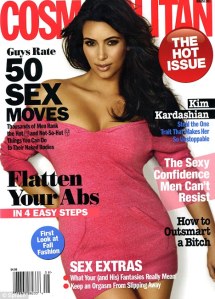I read one of the advice columns in this month’s Cosmo. A woman was writing in and asking if it would be okay to wear a top that reveals her tan lines to work, provided the top was modest and work-appropriate. The response was, no, it wouldn’t. Why? Because you wouldn’t want your boss to think that you spend your free time lying around at the beach:
Even though the best of us can fall victim to zebra skin by accident, exposing your sun stripes at work would be flaunting your bad judgement (baking does lead to skin cancer, after all). Perhaps worse, as far as your boss is concerned, it suggests you spend lots of your free time being at one with your beach towel–not exactly impressive.
“Not exactly impressive?” What does that even mean? Apparently, you shouldn’t let your boss know that you actually have fun on your days off. Oh, heavens no! You ought to be at home, catching up on emails.
(As for the skin cancer thing, I’d just like to point out that even if you wear sunscreen, you’re eventually going to get a tan if you spent a lot of time outside. Trust me, my mom slathers my little brother and sister with sunscreen obsessively, yet at the end of the summer they still have those cute little freckles and tan lines.)
Naturally, I immediately thought back to an earlier post I wrote about why adults are always so miserable and try to make me as miserable as they are. Now I’m not surprised. Apparently, once you’re all grown up and have a job, you’re not even allowed to have a good time when you’re off work. No wonder adults are always in such a crappy mood, and no wonder they want to warn me that in a few years I’ll be in a crappy mood too.
What shocks me is that Cosmo isn’t exactly a serious, business-y magazine. It’s mostly read by people who like to enjoy themselves every now and then (or every day/night, as the case may be). If even Cosmo is saying that you can’t have fun once you’re a grown-up (or, at the very least, that you have to do it in secret), what’s the world coming to?
This doesn’t even make sense to me, because I would hope that my boss would want me to come to work refreshed and in a good mood. I would want him/her to know that I’m not going to be asking for time off to go see a therapist about how miserable I am because I never have fun.
(I’m hoping, perhaps in vain, that since I’m going into the mental healthcare field, things will be different for me. After all, if there’s anyone who knows that relaxing and having fun is absolutely necessary, it’s a therapist. In my opinion, therapists should be able to model healthy behavior for their clients. If a client casually asks me what I did over the weekend and I’m forced to either lie or confess that I spent the entire time huddling over my laptop in a corner, crying, and biting my nails off while my husband played with the kids, that’s not good.)
Where did we go wrong? Why is it that in other countries and cultures, it’s perfectly normal to take a nap after lunch before coming back to work? Why is it that the United States is the only country I could find that does not mandate a minimum amount of paid vacation time for all employees? Why is the United States one of the only developed countries that does not offer paid maternity leave (to say nothing of paternity leave)?
One thing that never fails to surprise me about American culture is how fixated it is on work. Russians, for instance, seem to view work mostly as a means to an end (money, security, providing for one’s family), whereas for Americans, it’s an end in itself. I rarely hear my parents talking about work when they’re home, and the only time I’ve seen them doing work-related things at home is when my dad starts maniacally writing some sort of equations on a napkin. My parents don’t have smartphones or tablets. If you send an email to their work address on Friday evening, you won’t receive a response till Monday. And yes, they go to the pool on weekends, and evenings, and any other time they fucking feel like it. That, in my opinion, is how it should be.


